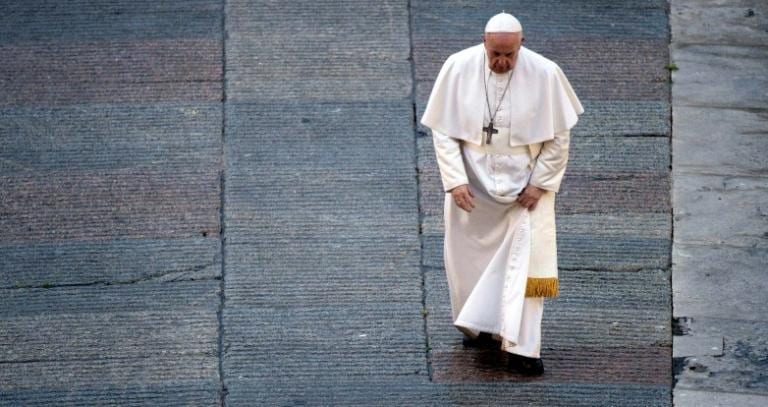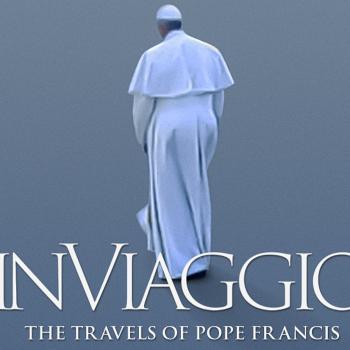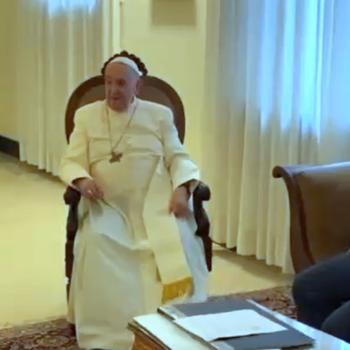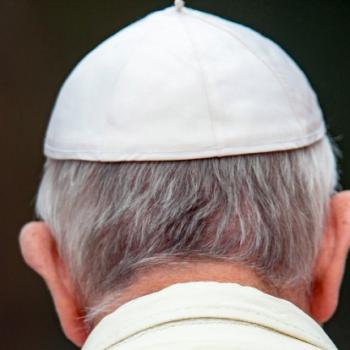
It’s hard not to be glad Francesco exists, even if filmmaker Evgeny Afineevsky’s 2020 documentary doesn’t cover Pope Francis in full.
Considering the avalanche of bad press the Catholic Church gets (admittedly, a lot deserved) and how little positive press it gets (it deserves way more), to have a gay, Russian-Jewish director and Israeli citizen do what amounts to a love letter to Pope Francis is both unusual and cause for gratitude.
On the heels of a virtual-cinema release, Francesco launches on new streaming service Discovery+ on Palm Sunday, March 28 (one day after the service’s release of Mark Burnett and Roma Downey’s Resurrection— more on that here — so they’re making a big Christian push at the beginning of Holy Week).
What Francesco covers, it covers well (other than beginning with one of the many quotes inaccurately ascribed to St. Francis). Using original interviews (including Pope Francis), along with news, and original and archival footage, it follows the globe-trotting pontiff as he deals with issues of the environment, illegal immigration, refugees, women’s rights, the sex-abuse crisis, and the pandemic (which was brutal in Italy, where the pope lives).
“For me, the key element was to tell the story of the world, of humanity and what state and what condition we are in, and him navigating us through this world, not just through the world of the Vatican or the Church.” — filmmaker Evgeny Afineevsky
At the recent virtual winter edition of the biannual TV Critics Association Press Tour, Afineevsky was asked about how much access the Vatican gave him. He said:
From the beginning, I got the green light to the Vatican. I never had any restrictions. I had the full freedom of the artist, because I know I was bound not by the network, not by the Vatican, only by what I am doing and what subjects I am tackling. So, I had full freedom.
Asked how he portrayed the difference between the opulence of the Vatican and the poverty in the developing world (with which Argentine Pope Francis is well acquainted):
For me, the key element was to tell the story of the world, of humanity and what state and what condition we are in, and him navigating us through this world, not just through the world of the Vatican or the Church.
From the beginning, the idea was to have us, humanity, as the key element of the story – what we created, what disasters we created, what poverty we created, what injustice we created. And to tell his story as somebody who is trying by himself to navigate us through it, to show us by example, to show us how we can step by step change these things.
Also on hand for the session was activist Juan Carlos Cruz, whose story of abuse in Chile eventually led to all of Chile’s 34 bishops tendering their resignations and the pope accepting many of them. Cruz, who is gay, also unsurprisingly disagreed with the Vatican’s recent statement rejecting official Church blessings for same-sex relationships.
“When he looks at you, you’re the only person that matters. He listens. He looks into your heart and, to me, when I felt my soul was dead, and I had nothing to live for, nothing worthwhile, this man — I remember the story in the Bible of Lazarus, right — like, he resurrected me.” — sex-abuse activist Juan Carlos Cruz.
In a famous excerpt from Francesco, which appeared in the media last fall, Francis is heard saying that same-sex couples deserve legal rights, and that they also deserve to feel like they are a part of families. This, though, is far from being the same thing as officially blessing same-sex relationships in defiance of the Church’s understanding of the nature of marriage.
A few days ago, not long after Cruz expressed his disapproval of the Vatican statement, news came out that Pope Francis had named Cruz as a member of the Pontifical Council for the Protection of Minors.
At TCA back in February, Cruz said:
You know, after my abuse and everything, and every survivor is in a world in its own right — but when I have the opportunity to be with him, and I’m with him regularly or often, I see a man who looks into your soul.
When he looks at you, you’re the only person that matters. He listens. He looks into your heart and, to me, when I felt my soul was dead, and I had nothing to live for, nothing worthwhile, this man — I remember the story in the Bible of Lazarus, right — like, he resurrected me.
And I think, because I’ve met other people that have experienced that, for me that’s what Pope Francis does so well. He gives you back your dignity. He makes you a Lazarus, and he instills in you the will to keep on and keep fighting and keep moving and aspire to great things.
Then it was my turn to ask a question. While I acknowledged that the issues covered in the film are near and dear to the pope’s heart, Francesco doesn’t cover other issues about which the pope has spoken frequently and vigorously, like the life issues of abortion, contraception and euthanasia. I wanted to know how Afineevsky decided what to put in and what to leave out.
He said:
For me, it was more important to not focus on the Catholic Church but to focus on the global issues that relate to the entire civilization, to humanity. That’s why I kind of tried to tackle more global-scale issues and not just to focus on abortion.
For me, there is nonstop issues that Pope Francis is tackling. Initially, the first cut of the movie was eight hours but, for me, as the filmmaker, I needed to create a comprehensive story for less than two hours.
That’s why I tried to focus only on essential global issues that related to every human being in the world and not just to the Church.
I tried to point out that life issues are universal, but the Zoom moderator moved on.
Pope Francis is the first pontiff to serve entirely in the social-media era and, for better or worse (and it has been both), has a lot to say to the media and the world at large.
Pope Francis is the first pontiff to serve entirely in the social-media era and, for better or worse (and it has been both), has a lot to say to the media and the world at large. I always wonder what we’d think of earlier popes if we had as much access to their thoughts and opinions as we do with Francis.
In a way, social and mass media have made him belong to the secular world to an extent that other popes — who lived in far different media environments — never quite did.
Overall, Francesco is respectful and moving — especially in its opening sequence, when the pope walks into an empty St. Peter’s Square to bless the suffering people of Rome during the early days of the pandemic — but it didn’t really grab me until the end.
Over the credits, a spectacular light show bathes St. Peter’s Basilica in both gorgeous and ugly images of human life and nature from around the globe. To me, it felt like the film was saying that the Church is the heart of the world.
Which, of course, she is.
Image: Discovery+
Don’t miss a thing: Subscribe to all that I write at Authory.com/KateOHare.














